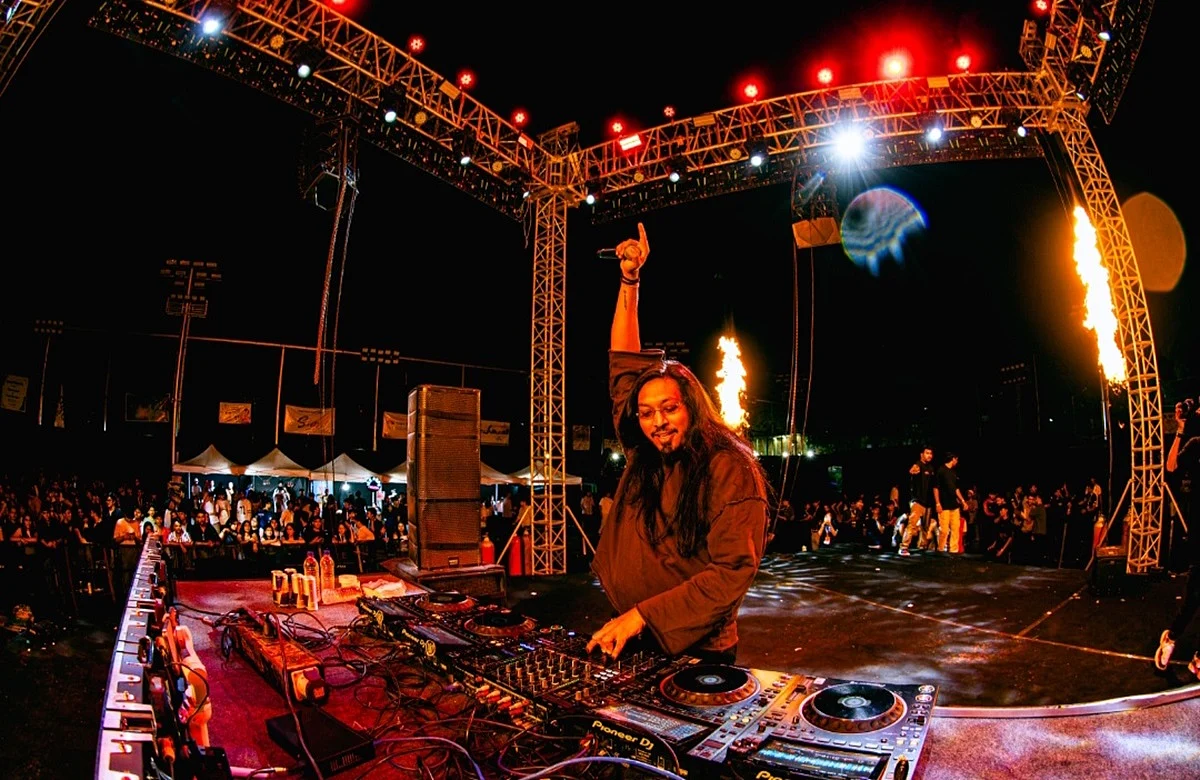For some minds in the world, the thought of a linear, norm-driven life is far from appealing; such individuals seek to immerse themselves in an ocean of novelty, where creativity knows no bounds. Multi-genre music producer and artiste Karan Kanchan is one of those rare minds. Apart from working with international greats like Jason Derulo, Russ, and Armani White, he has also composed and produced Bollywood songs, notably Ishq Nachave from the film Kho gaye hum kahan. Karan has also developed his own distinct style of Japanese-inspired Trap & Bass music, which he calls J-Trap. After heralding his show ‘Karan Kanchan’s Kitty Party’ at Big Bull Superclub in Financial District, he opens up to CE about his journey, what music production is all about, and more.
Excerpts
How was it performing in Hyderabad?
The show in Hyderabad was one of the best parties so far. I don’t think we have clubs anywhere in India with this level of production. People here are full of energy and have so much love for music. This was also my final show of my three-month residency at Big Bull, and what a way to end it!
Tell us about your journey.
In school, I’d spend time on YouTube and came across It isa track by Tiësto (Dutch DJ and record producer) and Diplo (American DJ and music producer). That track pulled me into my music production journey. Unlike other kids who played games and went out, I was into music. My parents saw my dedication, and all my dad said was, ‘Be dedicated to it’.
I got a degree in Journalism and Mass Communication, with a specialisation in sound engineering. But things didn’t start moving quickly — it took a while, during which I even did ghost production work for other people. After 2017, I launched myself as an artiste, making Japanese Trap music. That’s where my dance music journey started, and I then got into hip hop. I met a rapper in college who gave me my first hip hop sample bank, and I ended up making hip hop beats which eventually reached Indian rapper and songwriter Divine. I even did the production of Divine’s Baazigarsampled from the SRK-starrer Baazigar.
What does your work entail?
This is divided into two parts. One side is when I’m an artiste making music for myself; it’s more free-flowing, experimenting with drums and samples after getting inspired. The other side is when I’m working as a producer for others. In that role, I make sure their ideas and vision are brought to life as smoothly and efficiently as possible. That’s the job of a music producer — beyond handling the technical production, it’s also about deciding what kind of sound should be used and how everything fits together.

Can anybody do what Karan Kanchan does?
With the abundance of information and resources available today, anyone with a laptop can get started and learn the technical side of things. With platforms like Splice, and even digital audio workstations like FL Studio incorporating AI now, it’s even easier to put together a song. But in my view, these tools can only get you so far — what really sets successful artistes apart is instinct and creativity. Being able to fuse two seemingly polar opposite genres, knowing the right pockets to leave on your beats for rappers, and arranging in a way that doesn’t lose energy… these skills boil down to creativity.
What has the music industry taught you about life?
That you can never be too comfortable with where you are. The music industry is tricky and difficult to navigate: trends change, relevant genres change, new tools come, old ones go… this is a constant cycle. So, as an artiste, you should stay on your feet and be able to adapt.
How do you deal with rejection in the industry?
It bothered me greatly when I was younger, but I realised that rejection doesn’t necessarily mean you’re not good enough; it might just mean that something doesn’t fit at that moment in time. There have been films for which I’ve pitched 30 demos, and not one has been selected — this doesn’t mean I’m a bad producer or artiste; it just means it’s time to start working on the 31st.
What advice would you give your 15-year-old self?
When I was younger, I would worry too much about ‘Should I sign to a label?’, ‘Will this song do well?’, ‘How many streams will I get?’, and so on. I would tell 15-year-old Karan to just sit down quietly and make music, and everything else will work out just fine.





